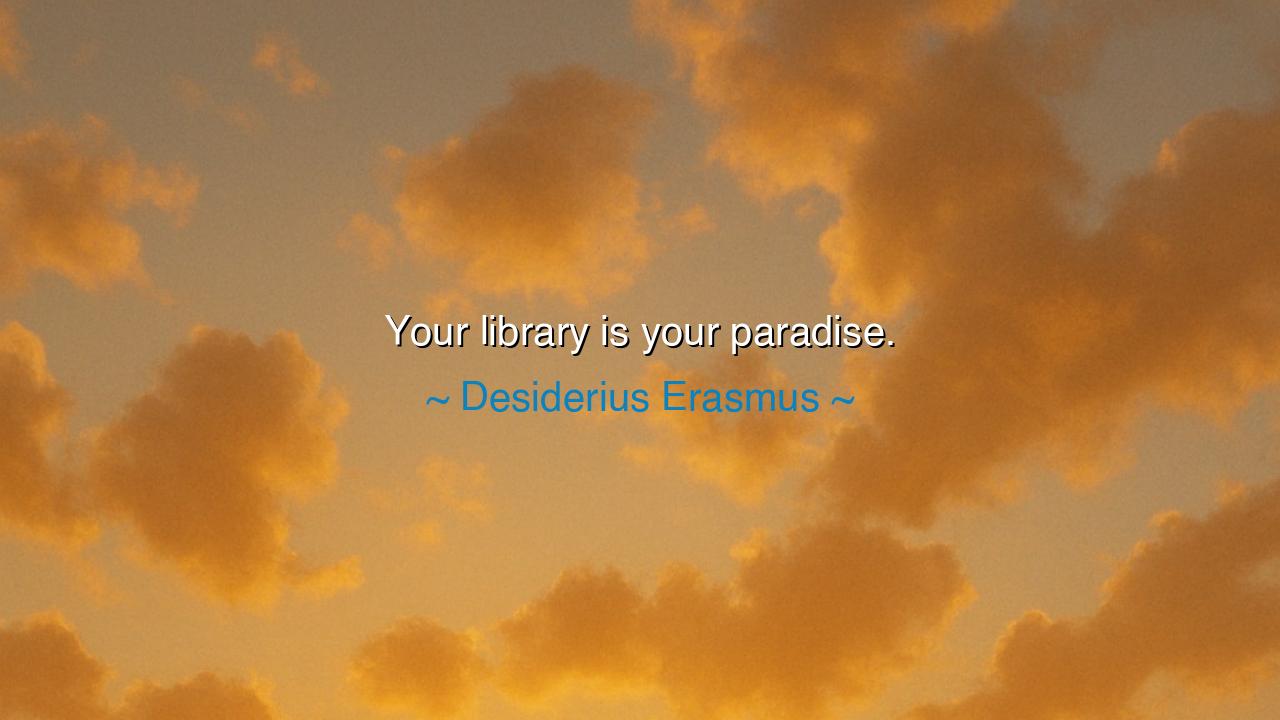
Your library is your paradise.






“Your library is your paradise.” Thus proclaimed Desiderius Erasmus, the great humanist of the Renaissance, whose life was devoted to the revival of wisdom through books, learning, and the inheritance of classical thought. In these words, he gave voice to the eternal truth that the treasures of the soul are not found in gold or jewels, nor in palaces or gardens, but in the quiet company of books. For the one who delights in wisdom, a library is no mere room of paper and ink—it is a paradise, a dwelling of eternal light, a sanctuary where the restless spirit finds peace.
The meaning of this saying is both simple and profound. A library is not just a place of storage but a temple of thought. In it live the voices of the dead, the counsels of the wise, the dreams of poets, and the discoveries of scientists. To step into a library is to step into a garden where each book is a tree bearing fruit, ripe for the mind to harvest. For Erasmus, who lived in an age of upheaval and uncertainty, books were the one unshakable refuge, the place where truth, beauty, and freedom of spirit could be found. Thus he called it his paradise, not because it was free of toil, but because it was rich in eternal nourishment.
The ancients knew this joy as well. In Alexandria, where the great library once stood, scholars from every corner of the world gathered to study the wisdom of mankind. For them, the library was not only a place of knowledge, but a symbol of unity, a paradise where nations and cultures met in harmony. And though that library was reduced to ashes, its spirit lived on in every monastery, every scribe’s workshop, every university that dared to preserve the written word. Erasmus, standing in this lineage, declared anew that paradise is not lost so long as one can sit with a book.
Consider the life of Frederick Douglass. Born into slavery, forbidden to learn, he nevertheless risked punishment to teach himself letters. Once he had gained the ability to read, even scraps of paper became a kind of paradise to him, for they opened the door to freedom. Later, Douglass would write that knowledge was the pathway out of chains. His story reveals the same truth Erasmus spoke: that a library, however small, however humble, is a paradise to those who hunger for wisdom and liberty.
Erasmus himself was a wanderer, a man without a permanent home, often caught in the conflicts of church and state. Yet wherever he traveled, he carried books, and wherever books were, there he found paradise. It was not wealth that gave him joy, nor power, nor security—it was the presence of learning. His life bears witness to the truth that paradise is not a place of leisure but of meaning, not a garden of pleasures but of insight. A library is paradise because it teaches us how to live, how to think, how to endure.
The lesson for us is clear: if you would build paradise, build a library. It need not be vast, nor filled with rare manuscripts. Even a small shelf of good books, chosen with care, can be a paradise to the soul. Parents, fill your homes with stories so your children may walk in gardens of imagination. Students, treasure your libraries as sacred halls, for within them lie the keys to your future. Citizens, defend your libraries, for when they perish, paradise is diminished for all.
So let Erasmus’s words echo as a call to reverence: “Your library is your paradise.” Do not look only to distant lands or golden palaces for joy, but to the shelves where wisdom waits quietly to be discovered. Enter them with gratitude, dwell in them with patience, and emerge from them renewed. For in truth, paradise is not beyond the stars, but already here—waiting for all who choose to open a book and walk in the gardens of knowledge.






AAdministratorAdministrator
Welcome, honored guests. Please leave a comment, we will respond soon